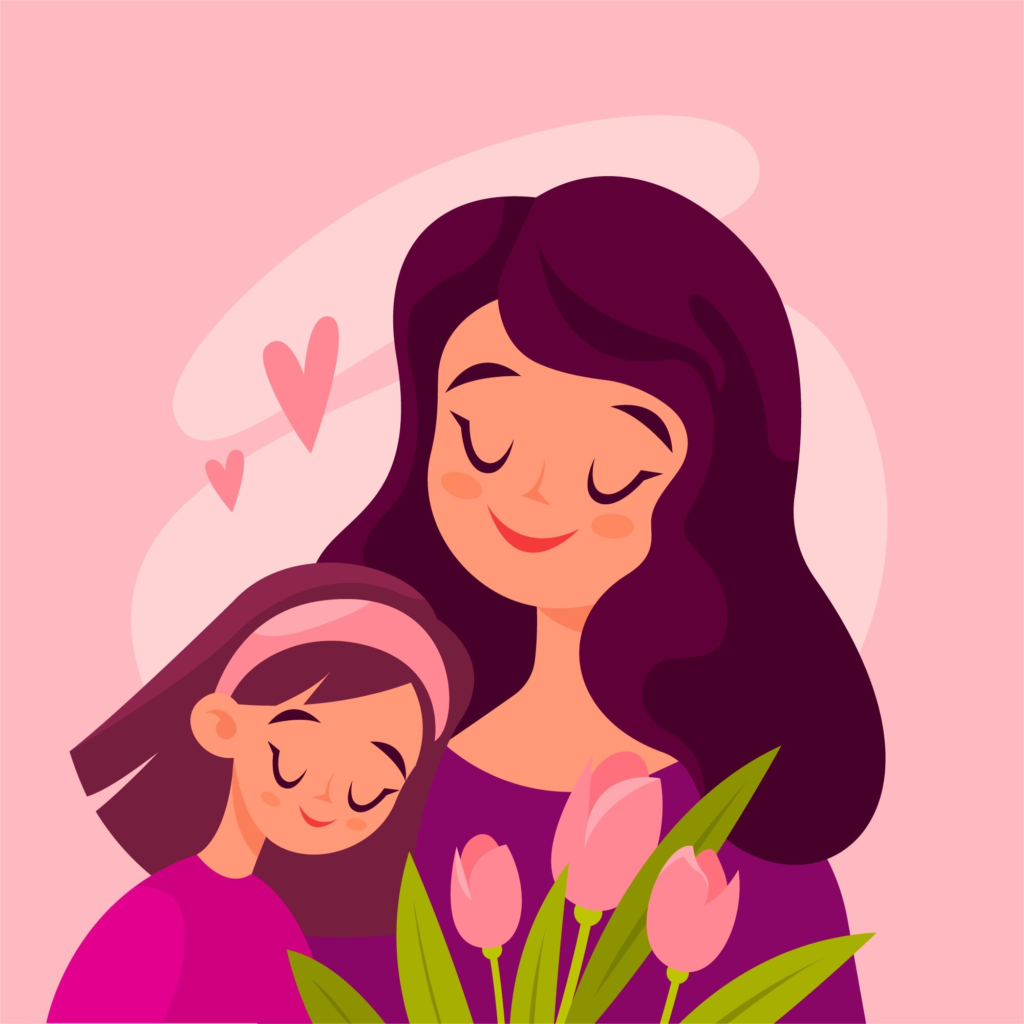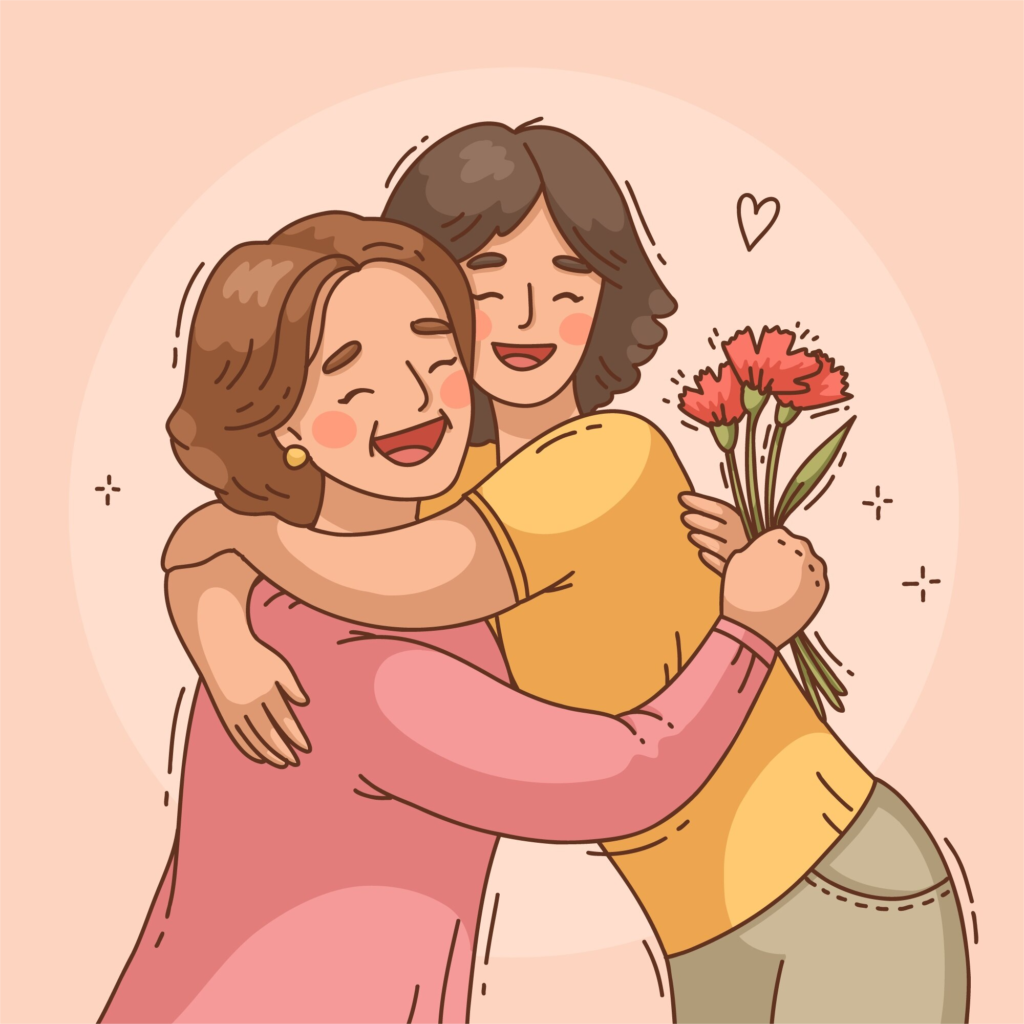안녕! (Annyeong)! Guess what’s coming up? International Women’s Day! It is a great reminder to celebrate the amazing women around us. Our mothers, grandmothers, sisters, and all the incredible ladies who make our lives better. Ever wondered how Koreans refer to these incredible women? You are in the right place!
In Korean, the way you address someone reflects your relationship with them. So, if you want to speak like a native and express warmth and respect, here are some Korean terms to call the special women in your life!
1. 어머니 (eo-meo-ni) / 엄마 (eom-ma) – “Mother / Mom”

First up is the queen of our hearts—mothers! Motherhood comes in many forms, biological or not, they’re the ones who nurture and support us. 어머니 (eo-meo-ni) is a formal way to say mother, while 엄마 (eom-ma) is more casual and affectionate, like saying mom or mommy.
Example:
Formal: “어머니, 잘 지내세요?” (Eo-meo-ni, jal ji-nae-se-yo?) – Mother, how have you been?
Casual: “엄마, 사랑해!” (Eom-ma, sa-rang-hae!) – Mom, I love you!
2. 할머니 (hal-meo-ni) – “Grandmother”

Grandmothers bring warmth and wisdom to the family, and in Korean, we call them 할머니 (hal-meo-ni). Whether it’s your own grandmother or someone else’s, this is the respectful and natural way to address them.
Example:
“할머니, 건강하세요!” (Hal-meo-ni, geon-gang-ha-se-yo!) – Grandma, stay healthy!
3. 언니 (eon-ni) / 누나 (nu-na) – “Older Sister”

If you have an older sister or even a close older female friend, here’s how you can call them:
언니 (eon-ni) – If you’re a woman talking to your older sister.
누나 (nu-na) – If you’re a man talking to your older sister.
Koreans also use these words for close friendships! If a girl has an older female bestie, she might call her 언니, just like a real sister.
Example:
“언니, 뭐 해?” (Eon-ni, mwo hae?) – Unni, what are you doing?
“누나, 같이 밥 먹을래요?” (Nu-na, gat-chi bap meok-eul-lae-yo?) – Noona, do you want to eat together?
4. 아줌마 (a-jum-ma) / 아주머니 (a-ju-meo-ni) – “Ma’am / Middle-aged Woman”

If you’ve watched K-dramas, you’ve probably heard 아줌마 (a-jum-ma). It’s a casual way to address a middle-aged woman, like an auntie or a lady at a store or restaurant. However, since some women may find 아줌마 (a-jum-ma) too informal, the more polite version is 아주머니 (a-ju-meo-ni). If you’re talking to a stranger or want to be respectful, 아주머니 (a-ju-meo-ni) is the better choice.
Example:
Casual: “아줌마, 김치찌개 하나 주세요.” (A-jum-ma, gim-chi-jji-gae ha-na ju-se-yo.) – Ma’am, please give me one kimchi stew.
Polite: “아주머니, 계산할게요.” (A-ju-meo-ni, gye-san-hal-ge-yo.) – Ma’am, I’d like to pay.
5. 여사님 (yeo-sa-nim) – “Madam” (Respectful Term for Older Women)

If you want to respectfully address an older woman you don’t know personally (like a professor, a senior at work), 여사님 (yeo-sa-nim) is an extra polite way to refer to them. However, this term should be avoided in casual or everyday situations such as meeting your new friend’s mother or while talking to a shopkeeper.
Example:
“여사님, 반갑습니다.” (Yeo-sa-nim, ban-gap-seum-ni-da.) – Nice to meet you, ma’am.
6. 여왕님 (yeo-wang-nim) – “Queen” (For Fun & Admiration!)

While this isn’t a standard everyday term, Koreans sometimes jokingly call someone 여왕님 (yeo-wang-nim), which means “queen”. You can use this in a playful way to compliment someone, maybe your best friend, mom, or even yourself!
Example:
“우리 엄마는 진짜 여왕님이에요!” (U-ri eom-ma-neun jin-jja yeo-wang-nim-i-e-yo!) – My mom is truly a queen!
Call Them with Love!
The way we address someone shows how much we respect and care for them. Whether it’s 엄마, 할머니, or even 언니, using these terms in Korean adds a thoughtful touch to your appreciation.
Who’s the first person you’re going to call in Korean today? Let’s celebrate the wonderful women in our lives, one word at a time!
Written by – Surbhi
Connect with us on Instagram | X | YouTube for more content, interviews, & news.














